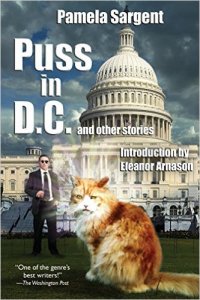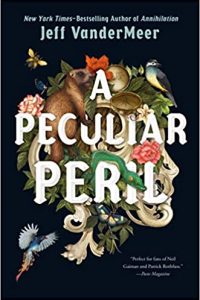Paul Di Filippo reviews Pamela Sargent
Puss in D.C. and Other Stories, by Pamela Sargent (Wildside Press 978-1-4794-0614-2, $13.99, 176pp, trade paperback) June 19, 2015
 This year marks the forty-fifth anniversary of Pamela Sargent’s first short story sale (“Landed Minority,” F&SF, 1970), and she’s still at the top of her game, as the ten polymorphous and polychromatic entries in this newest collection attest. Like a select few in her cohort, she has endured and flourished through all the stages of an archetypical authorial career, from tyro to journeywoman to sage mistress of the field. But although she is well known for her novels, and for her editorial efforts on the Women of Wonder series of anthologies, her short fiction seems sometimes to take a back seat to these other efforts. With luck, this new assemblage will draw audience attention in this direction.
This year marks the forty-fifth anniversary of Pamela Sargent’s first short story sale (“Landed Minority,” F&SF, 1970), and she’s still at the top of her game, as the ten polymorphous and polychromatic entries in this newest collection attest. Like a select few in her cohort, she has endured and flourished through all the stages of an archetypical authorial career, from tyro to journeywoman to sage mistress of the field. But although she is well known for her novels, and for her editorial efforts on the Women of Wonder series of anthologies, her short fiction seems sometimes to take a back seat to these other efforts. With luck, this new assemblage will draw audience attention in this direction.
Certainly the empathetic and insightful introduction by Eleanor Arnason makes a good case for the high stature of these stories. But let’s look for ourselves.
The title piece comes first. Appearing initially in a Marty Greenberg theme anthology, it necessarily follows the dictates of that project and recapitulates a famous folktale—”Puss in Boots”—in modern terms. But the story does not rely overmuch on familiarity with the myth, although the Easter Eggs for the cognoscenti are in place. Sargent lays out the premise neatly and intelligibly, then chooses to deviate from the template when the narrative demands. The voice of Angleton the cat—who sounds “just like Jeremy Irons”—is convincingly both human and feline, breezy yet showing gravitas, and the topical elements of the tale consort well with the legendary Machiavellian abilities of Puss.
“Strawberry Birdies” reminds me of the facility with which Henry Kuttner wrote of strange kids, as well as resonating with Ellison’s “Jeffty is Five.” Into the Almstead household comes a weird young woman named Maerleen Loegins. Helping to take care of the children, among whom is the bright and suspicious young girl named Addie, Maerleen seems to focus on the disabled brother Cyril. And indeed, the relationship between adult and child has the potential to divert world events.
“After I Stopped Screaming” strikes me as almost a Howard Waldrop story, riffing as it does on the King Kong mythos. We learn from Ann Darrow just what was behind the big ape’s quest, and the revelations prove to overturn all the clichés that have accumulated around this modern fairytale.
Like the first story, “The Rotator” features plenty of astringent commentary on current politics, but wraps it up in the kind of hall-of-mirrors mind-game that William Tenn excelled in.
Partnered for decades in her personal life with George Zebrowski, Sargent has deliberately chosen to avoid excessive literary collaboration with her mate. But together they produced “The Falling,” and achieved a kind of metaphysical story of cosmic estrangement that might have been featured in the pages of New Worlds, or seen more recently in a Greg Egan collection. Our heroine, Elaine, becomes instrumental in learning about a strange malaise infecting all of humanity. But the limits of such knowledge have never been clearer.
“Strip-Runner” is the longest tale here, being an homage to the works of Isaac Asimov, specifically the R. Daneel Olivaw books. Sargent delivers the most assured recreation of Asimovian voice that I have ever seen, in her tale of Amy, teenage rebel in the caves of steel. And she manages to tease out hidden implications from Asimov’s own premises.
“Reifying a metaphor” is the descriptive label I slap on certain stories of my own and others, and it’s a particularly strong technique among SF writers. Take a whimsical simile or fanciful analogy and assume it becomes concrete. In the case of Sargent’s stimulating “A Smaller Government,” we get a literal shrinkage of Washingtonian monuments and bureaucracies.
“Not Alone” is a condensed piece of flash fiction that still packs a wallop, dealing as it does with the existential quandaries of its protagonist.
Like Stephen King’s writings about writers and their fans, “The Drowned Father” skims along the surface tension between creepiness and mundanity, in a Strangers on a Train mode, as we overhear the chance conversation between a failed author and the daughter of a successful dead one. Any likenesses to Kilgore Trout or Philip K. Dick are strictly intentional.
Finally comes “The True Darkness,” a story akin to “The Falling,” in that it investigates cosmological quirks that border on the supernatural. It strikes me that younger authors of apocalypses, such as Ben Marcus (The Flame Alphabet) or Alena Graedon (The Word Exchange), are carrying forward this mode that Sargent helped to establish.
Sargent’s prose is always distinctively hers, yet molded professionally to the imperatives of the story, whether those urges are tonal or character-driven. Not a rococo stylist, nor a writer given to flashy experimental story-telling techniques, she believes in delivering her mind-movies in the most direct and impactful manner possible. Her stories always seem utterly vital and imperative, not factitious or arbitrary. They are built to convey solid truths in lasting forms.
I would be remiss if I did not finally mention that Sargent provides charming and informative afterwords to all these stories, contributing anecdotal data to what Barry Malzberg calls “The True and Secret History of Science Fiction.” Just as Jack Williamson and Andre Norton once served as the living connection to the earliest days of our genre, so too does Sargent stand nowadays as one of the repositories of our past, while still facing firmly forward into her fascinating futures.





